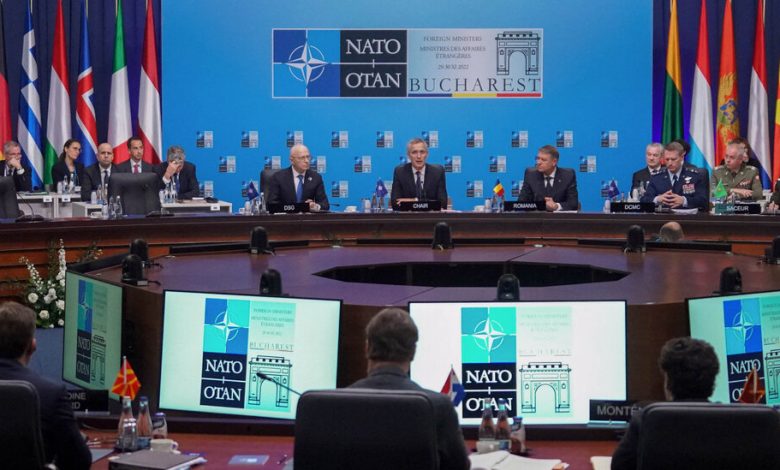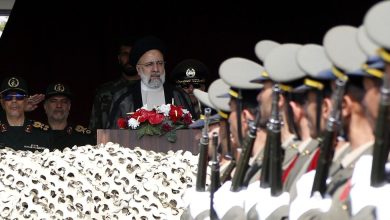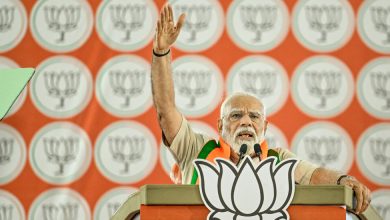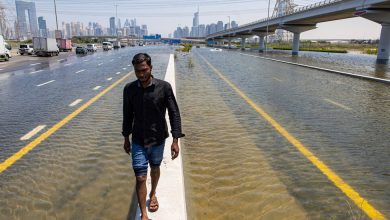NATO ‘will not back down’ in its support for Ukraine, its secretary general says.

BUCHAREST, Romania — Antony J. Blinken, the U.S. secretary of state, and the top diplomats from more than 30 European nations are meeting on Tuesday in Romania to coordinate how the North Atlantic Treaty Organization will bolster Ukraine’s war efforts against Russia over the harsh winter.
The officials plan to discuss further weapons shipments to Ukraine, as well as how to help repair Ukraine’s electricity grid and defend the country’s critical infrastructure against relentless missile, artillery and drone attacks by the Russian military.
A senior State Department official traveling with Mr. Blinken said Monday that the United States plans to announce cash aid to Ukraine for energy infrastructure needs on an emergency basis.
“NATO is stronger and more united than at any time I can remember,” Mr. Blinken said at a news conference on Tuesday with Jens Stoltenberg, the alliance’s secretary general, before the meeting. “We will be reaffirming our support for Ukraine as we go forward.”
Mr. Blinken held separate meetings with top Romanian officials Tuesday morning. He said that the United States would work with Romania to help it achieve energy independence from Russia, and to build up its military capabilities, which would operate with those of its allies.
The State of the War
- A Pivotal Point: The Ukrainian army is on the offensive, and the Russians are in a defensive crouch. But with about one-fifth of its territory still occupied by Moscow’s forces, Ukraine has a long way to go, and the onset of winter will bring new difficulties.
- A Bloody Vortex : Even as they have celebrated successes elsewhere, Ukrainian forces in the small eastern city of Bakhmut have endured relentless Russian attacks. And the struggle to hold it is only intensifying.
- Russian Missile Barrage: A wave of Russian missile strikes on Ukraine’s essential services has caused blackouts in hospital operating rooms and cut off power and running water in cities.
- Dnipro River: A volunteer Ukrainian special forces team has been conducting secret raids under the cover of darkness, traveling across the strategic waterway that has become the dividing line of the southern front.
The two-day meeting of foreign ministers is taking place in Bucharest, the capital of Romania, a NATO member country that shares a border with Ukraine. It is expected to lay the groundwork for how the alliance will continue to aid Ukraine at a time when winter weather might limit military gains and as millions of Ukrainian civilians lack access to electricity and water because of damage to infrastructure facilities caused by Russian strikes.
“NATO will continue to stand for Ukraine as long as it takes,’” Mr. Stoltenberg said as the diplomats gathered. “We will not back down.”
Another State Department official said the Russian military is using missiles and drones to hit Ukraine’s transmission grid, including high-voltage transformer stations, because those are more vulnerable than power generation sites. He estimated that 25 to 30 percent of Ukraine’s energy infrastructure has been damaged.
American and European officials say President Vladimir V. Putin of Russia is trying to break the morale of Ukrainians by depriving them of basic utilities over the winter, when average temperatures across Ukraine drop below freezing. The Russian military has suffered major setbacks in the face of Ukrainian offensives in recent months, including being forced to retreat from the strategic southern city of Kherson and the Kharkiv region in the northeast.
NATO countries have so far provided some $40 billion in weaponry to Ukraine, roughly the size of France’s annual defense budget. But Ukraine has been tearing through stockpiles, setting off a scramble to supply the country with what it needs while also replenishing NATO members’ arsenals. Many Western-made howitzers are breaking due to the rate of use by Ukrainian troops.
The meeting this week is also expected to feature discussion of how to better protect the member nations that are in closest proximity to Ukraine, including Poland and Romania, from any potential spillover from the conflict. The topic took on a renewed sense of urgency this month when a missile that NATO leaders said appeared to have been fired by Ukraine’s air defense killed two civilians in southeastern Poland.
The foreign ministers of Sweden and Finland, which both applied for NATO membership after Mr. Putin ordered the full-scale invasion of Ukraine in February, are expected to attend the meeting, as are top diplomats from Ukraine, Georgia, Moldova and Bosnia and Herzegovina.
At a NATO meeting in 2008 in Bucharest, President George W. Bush pushed members of the alliance to promise Ukraine and Georgia eventual membership, but without a timeline. Officials say both countries remain far from qualifying for membership but are considered critical partners of NATO.
Mr. Stoltenberg and the U.S. State Department also said that officials would discuss the global challenges posed by China, Russia’s most powerful strategic partner.




